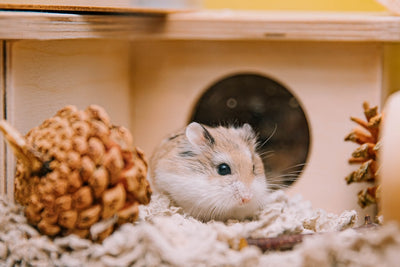Choosing the Right Substrate for Your Green Iguana

Choosing the right substrate for your green iguana is crucial for their health and well-being. The type of substrate you use in their enclosure can have a significant impact on their overall comfort, hygiene, and even their behavior. With a variety of substrates available, it's important to understand their pros and cons to make an informed decision. In this blog, we will explore the different types of substrates suitable for green iguanas and discuss why choosing the right one is essential for their overall care. Let's dive in!
Traditional Substrates for Green Iguana Enclosures
When it comes to choosing a substrate for your green iguana's enclosure, there are several traditional options to consider. Each substrate has its own benefits and drawbacks, so it's important to choose one that meets the specific needs and preferences of your iguana.
Newspaper
-
Benefits:
- Cheap and easily accessible
- Easy to clean and replace
-
Drawbacks:
- Does not provide much traction or enrichment for the iguana
- Not aesthetically pleasing
Paper Towels
-
Benefits:
- Easy to clean and replace
- Provides traction for the iguana
-
Drawbacks:
- May not be as visually appealing as other substrates
Reptile Carpet
-
Benefits:
- Durable and long-lasting
- Provides traction for the iguana
- Adds aesthetic value to the enclosure
-
Drawbacks:
- Requires more maintenance and cleaning compared to other substrates
When using traditional substrates, it's important to properly use and maintain them. Regular cleaning and spot cleaning should be done to keep the substrate clean and hygienic for the iguana. It's also important to monitor the iguana's behavior and health to ensure that the substrate is not causing any issues.
Overall, traditional substrates like newspaper, paper towels, and reptile carpet can be suitable choices for green iguana enclosures. Consider the specific needs and preferences of your iguana when selecting the substrate, and remember that proper use and maintenance are key to keeping the enclosure clean and comfortable for your iguana.
The Benefits of Bioactive Substrates for Green Iguanas
Bioactive substrates have gained popularity among green iguana owners because they create a more natural and enriching environment for these reptiles. Unlike traditional substrates made of artificial materials, bioactive substrates consist of organic soil, leaf litter, and beneficial microorganisms. This combination mimics the green iguanas' natural habitat, providing them with a comfortable and stimulating living space.
Setting Up a Bioactive Substrate
- Layer the enclosure with a base of organic soil to serve as the foundation for the substrate.
- Add a layer of leaf litter to provide hiding spots and contribute to the overall aesthetic of the enclosure.
- Introduce beneficial microorganisms, such as springtails and isopods, to help break down waste and maintain a healthy substrate.
Maintaining a Bioactive Substrate
- Microorganisms naturally break down waste, reducing the need for frequent cleaning.
- Monitor the substrate's moisture levels and make adjustments as needed.
- Periodically add new leaf litter and microorganisms to sustain the substrate's ecosystem.
Maintaining a bioactive substrate is relatively low-maintenance compared to traditional substrates. The microorganisms present in the substrate will naturally break down waste, reducing the need for frequent cleaning. However, it is still important to monitor the substrate's moisture levels and make adjustments as needed. Additionally, periodically adding new leaf litter and microorganisms will help sustain the substrate's ecosystem.
Creating a Natural and Enriching Environment
Bioactive substrates offer numerous benefits for green iguanas, including:
- A more natural habitat that closely resembles their natural surroundings.
- Enhanced overall well-being for the iguanas.
- Opportunities for exploration and mental stimulation.
By incorporating organic soil, leaf litter, and beneficial microorganisms, you can create a habitat that closely resembles the green iguanas' natural surroundings. This not only enhances their overall well-being but also provides them with opportunities for exploration and mental stimulation.
So, why not give bioactive substrates a try and see the positive impact they can have on your green iguana's quality of life?
Substrate Options for Green Iguanas
When it comes to substrate options for green iguanas, there are a few alternatives to consider besides the traditional substrate. Here are three options to consider:
- Coconut Fiber: Made from the husks of coconuts, coconut fiber provides a natural, soft bedding that mimics the forest floor - similar to the iguana's natural habitat. It is easy to clean and can help prevent impaction. However, it may need to be replaced more frequently.
- Cypress Mulch: Cypress mulch is a type of wood-based substrate that is absorbent and can help maintain humidity levels in the enclosure. It is great for maintaining humidity, but it can be messy and may need to be replaced regularly.
- Peat Moss: Peat moss is lightweight and retains moisture well, making it ideal for maintaining the proper humidity levels for green iguanas. It may not be as easy to clean and can be more expensive.
Each alternative substrate option has its own benefits and drawbacks. To determine which substrate option is best for your green iguana, consider factors such as your iguana's preferences, enclosure setup, and your own personal preferences:
- Coconut fiber may be a good option if you want a natural, soft bedding that is easy to clean.
- Cypress mulch could be a good choice if maintaining humidity is a priority for you.
- Peat moss may be the best option if you want a lightweight substrate that retains moisture well.
Ultimately, it is important to choose a substrate that promotes the health and well-being of your green iguana.
Factors to Consider When Choosing a Substrate for Green Iguanas
When it comes to choosing a substrate for your green iguana's enclosure, there are several important factors to consider:
- Humidity Level: Green iguanas require a certain level of humidity to thrive. Choose a substrate that can help maintain the appropriate moisture levels. Substrates like coconut fiber or cypress mulch are excellent at retaining moisture and creating a humid environment that mimics the iguana's natural habitat.
- Cleanliness: Green iguanas are known for their messy habits. Choose a substrate that is easy to clean. Substrates like newspaper or reptile carpet can be easily removed and replaced, making cleaning a breeze. Avoid substrates like sand or gravel, which can be more challenging to clean and may require more frequent maintenance to prevent odor and bacteria buildup.
- Needs of Your Iguana: Consider the natural habitat of green iguanas and try to replicate it as closely as possible. Substrates like soil or bark chips can provide a more naturalistic environment for your iguana. Others, like paper towels or reptile bedding, may be more practical for owners who prefer easy cleanup and maintenance.
By considering factors like humidity, cleanliness, and the needs of your green iguana, you can make an informed decision when choosing a substrate for their enclosure. It's important to research and consider the specific requirements of green iguanas to ensure their health and well-being in captivity.
Substrate Safety for Green Iguanas
Substrate safety is a crucial aspect of caring for green iguanas. It's important to address the potential hazards and safety concerns related to substrates to ensure the well-being of these reptiles.
One of the main risks is impaction , which occurs when the iguana ingests harmful materials such as sand or gravel. This can lead to blockages in their digestive system and cause serious health issues.
Another concern is bacterial growth , as certain substrates can provide a breeding ground for harmful bacteria that can make your iguana sick.
To minimize these risks and ensure the safety of your green iguana, there are a few tips you can follow:
- Avoid using loose substrates like sand or gravel that can be easily ingested. Instead, opt for solid substrates such as reptile carpet or paper towels. These provide a safe and hygienic surface for your iguana to walk on.
- Regularly clean and disinfect the enclosure to prevent bacterial growth. This includes removing any feces or uneaten food promptly and cleaning the substrate thoroughly.
It's also important to provide a comfortable and enriching environment for your green iguana. This includes ensuring that the enclosure is properly sized and has appropriate climbing structures and hiding spots. By creating a stimulating environment, you can help prevent boredom and reduce the risk of stress-related behaviors or health issues.
Overall, substrate safety is a crucial aspect of green iguana care that should not be overlooked. By taking the necessary precautions and providing a safe and enriching environment, you can ensure the well-being of your pet iguana.
Choosing the Best Substrate for Your Green Iguana
When it comes to choosing the best substrate for your green iguana, there are a few key points to consider. Let's summarize what we've discussed so far:
- Green iguanas prefer substrates that mimic their natural environment, such as soil, sand, or a mixture of both. These substrates provide a comfortable surface for the iguana to walk on and can also help maintain humidity levels in their enclosure.
- Avoid substrates that can cause impaction or respiratory issues, such as cedar chips or pine shavings.
Based on the needs and preferences of green iguanas, I would recommend using a mixture of organic topsoil and play sand as a substrate. This combination provides a natural feel and allows for digging and burrowing, which is important for the iguana's mental stimulation. It also holds moisture well, helping to maintain the appropriate humidity levels in the enclosure. Make sure to provide a depth of at least 6 inches to allow for proper digging.
However, it's important to note that every iguana is unique, and their preferences may vary. That's why it's crucial to monitor your iguana's behavior and adjust the substrate as needed. Some iguanas may prefer a slightly damper substrate, while others may prefer a drier one. By observing your iguana's behavior, you can make the necessary adjustments to create the ideal substrate environment for them.
Remember, the substrate is just one aspect of creating a comfortable and stimulating habitat for your green iguana. Don't forget to provide plenty of climbing branches, hiding spots, and enrichment activities to keep your iguana happy and healthy. By choosing the right substrate and monitoring your iguana's behavior, you can create an environment that mimics their natural habitat and meets their specific needs.
Choosing the Right Substrate for Your Green Iguana
Choosing the right substrate for your green iguana is crucial for creating a comfortable and stimulating habitat. Different substrates offer various benefits and considerations. In this blog post, we will explore different substrate options and provide guidance on making an informed decision based on your specific needs and preferences.
Traditional Substrates
Traditional substrates like newspaper and paper towels are easy to clean and maintain. They are a popular choice for many iguana owners. However, it's important to note that these substrates may not provide the same level of enrichment as bioactive substrates.
Bioactive Substrates
Bioactive substrates promote natural behaviors and create a more dynamic environment for your iguana. They consist of a combination of organic materials that provide a habitat for beneficial microorganisms. This natural ecosystem helps break down waste and maintain the overall health of the enclosure.
When selecting a substrate, consider factors such as ease of cleaning, moisture retention, and the natural habitat of green iguanas. By providing a suitable substrate, you can ensure that your green iguana has a comfortable and engaging living space.
As the saying goes, "Choose the right substrate, and your green iguana will thrive." So, take the time to research and experiment with different substrates to create the perfect environment for your scaly friend. A well-chosen substrate is the foundation of a happy and healthy iguana habitat.
Explore a wide range of reptile supplies at [Talis-US](https://talis-us.com/) to find the perfect substrate for your green iguana. Whether you prefer traditional or bioactive substrates, our selection has something for every iguana owner. Enhance your reptile's habitat and provide them with the best possible living conditions. Your green iguana will thank you!






